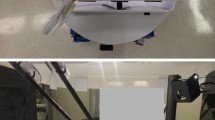Abstract
Background
The fundamentals of laparoscopic surgery (FLS) program was developed by the Society of American Gastrointestinal and Endoscopic Surgeons (SAGES) in 1997 with the goal of teaching surgeons the fundamental knowledge, judgment, and technical skills specific to laparoscopic surgery (Peters et al., Surgery JH 135:21–27, 2004; Soper et al., Bull Am College Surg NJ 93:30–32, 2008). This single academic institution observational study aimed to assess the effectiveness of a biannual FLS training curriculum on Post-Graduate Year [PGY] 1-5 proficiency levels, with a focus on one FLS task (PEG transfer). Previous studies have shown that obtaining expert FLS proficiency correlates with retaining proficiency in the future (Castellvi et al., Surgery 146:387–393, 2009).
Methods
PGY 1-5 residents (n = 28) at an academic general surgery residency program performed two timed PEG transfer tasks biannually. Participants were monitored by FLS certified examiners and standard FLS rules applied. Residents were expected to meet or exceed standards set by SAGES and FLS in consecutive timed PEG transfer trials (proficiency: <48 s).
Results
Twenty-eight residents participated (PGY 1-5). Participants showed proficiency if they completed the PEG transfer task in less than 48 s on two consecutive trials. None of the PGY 1 or PGY 2 residents completed two consecutive trials within the stated proficiency time, while the majority of the PGY 3-5 residents showed proficiency in the PEG transfer task.
Conclusion
A biannual training session for FLS retains expert proficiency by PGY levels 4-5. Previous reports from our institution demonstrated that 95 % of the residents did not practice this task between mandatory biannual sessions. This suggests that, in combination with standard residency training, biannual FLS sessions confer retained expert skills by PGY 4-5. As the FLS exam is generally taken by PGY 4 and 5 residents and is required for board certification, general surgery residents that participate in biannual training sessions will likely retain expert proficiency and achieve FLS certification.



Similar content being viewed by others
References
Peters JH, Fried GM, Swanstrom LL, Soper NJ, Sillin LF, Schirmer B, Hoffman K, The SAGES FLS Committee (2004) Development and validation of a comprehensive program of education and assessment of the basic fundamentals of laparoscopic surgery. Surgery 135:21–27
Soper NJ, Fried GM (2008) The fundamentals of laparoscopic surgery: its time has come. Bull Am College Surg 93:30–32
Castellvi AO, Hollett LA, Minhajuddin A, Hogg DC, Tesfay ST, Scott DJ (2009) Maintaining proficiency after fundamentals of laparoscopic surgery training: a 1-year analysis of skill retention for surgery residents. Surgery 146:387–393
Edelman DA, Mattos MA, Bouwman DL (2010) FLS skill retention (learning) in first year surgery residents. J Surg Res 163:24–28. doi:10.1016/j.jss.2010.03.057
Fried GM, Feldman LS, Vassiliou MC, Fraser SA, Stanbridge D, Ghitulescu G, Andrew CG (2004) Proving the value of simulation in laparoscopic surgery. Ann Surg 240:518–528
Scott DJ, Hafford M, Willis RE, Gugliuzza K, Wilson TD, Brown KM, Vansickle KR (2013) Ensuring competency: are fundamentals of laparoscopic surgery training and certification necessary for practicing surgeons and operating room personnel? Surg Endosc 27(1):26–118. doi:10.1007/s00464-012-2437-7
Mashaud LB, Castellvi AO, Hollett LA, Hogg DC, Tesfay ST, Scott DJ (2010) Two-year skill retention and certification exam performance after fundamentals of laparoscopic skills training and proficiency maintenance. Surgery 148:194–201
Stefanidis D, Sierra R, Markley S, Korndorffer JR Jr, Scott DJ (2006) Proficiency maintenance: impact of ongoing simulator training on laparoscopic skill retention. J Am Coll Surg 202:599–603
Scott DJ, Ritter EM, Tesfay ST, Pimental EA, Nagji L, Fried GM (2008) Certification pass rate of 100 % for fundamentals of laparoscopic surgery skills after proficiency-based training. Surg Endosc. doi:10.1107/s00464-0089745-y
Sroka G, Feldman LS, Vassiliou MC, Kaneva PA, Fayez R, Fried G (2010) Fundamentals of laparoscopic surgery simulator training to proficiency improves laparoscopic performance in the operating room—a randomized controlled trial. Am J Surg 199:115–120
Fried GM, Derossis AM, Bathwell J et al (1999) Comparison of laparoscopic performance in vivo with performance measured in a laparoscopic simulator. Surg Endosc 13(11):1077–1081 discussion 1082
Scott DJ, Bergen PC, Rege RV et al (2000) Laparoscopic training on bench models: better and more cost effective than operating room experience? J Am Coll Surg 191(3):83–272
Disclosures
Drs. Shawn Tsuda, Lindsay Wenger, and Cory Richardson have no conflicts of interest or financial ties to disclose.
Author information
Authors and Affiliations
Corresponding author
Rights and permissions
About this article
Cite this article
Wenger, L., Richardson, C. & Tsuda, S. Retention of fundamentals of laparoscopic surgery (FLS) proficiency with a biannual mandatory training session. Surg Endosc 29, 810–814 (2015). https://doi.org/10.1007/s00464-014-3759-4
Received:
Accepted:
Published:
Issue Date:
DOI: https://doi.org/10.1007/s00464-014-3759-4




